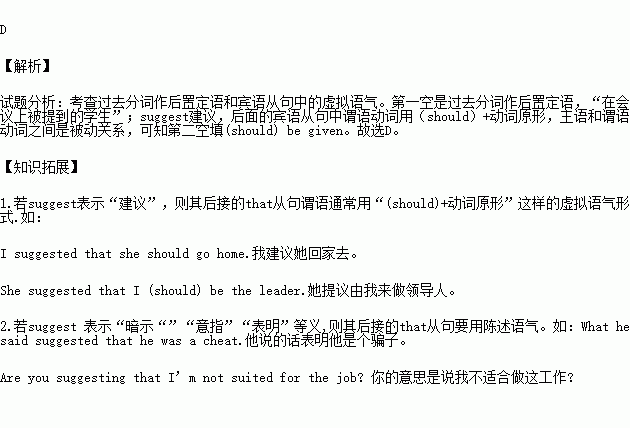题目内容
The headmaster suggested the students ________ to at the meeting ________ a prize.
A. referred; gave
B. referring; giving
C. referring; to be given
D. referred; be given
What is “Dads Make a Difference”?
A service-learning opportunity for teens that deals with fatherhood, parenting, and so on.
Older teens, grades 10—12, teach younger teens, grades 6—9, about the importance of fathers in children’s lives, the legal and financial responsibilities of parenting.
Teen teacher training goals & objectives
The goal of the teen teacher training is to better understand the complex problems surrounding legal fatherhood in our society. By discussing what makes healthy families, explaining the meaning of paternity(父亲的身份), and examining the risks people take in their lives, teens will develop the skills needed to make informed decisions in their own relationships and, finally, teach this information to others.
What’s in it for me?
An opportunity to:
Learn life skills like communication, decision making, and problem solving.
Get the chance to use knowledge in meaningful and effective ways.
Develop leadership, planning, teamwork, time management, and organizational skills to help you in every aspect of your life.
Forming lasting relationships with adult mentors(导师).
Comments from teen teachers
“ ‘Dads Make a Difference’ made me realize how permanent and expensive parenthood is.”
“Speaking in form of groups and directing people in activities, I feel, is a valuable skill to have that I will use throughout my life.”
“I wish I would have gone through this program when I was in Junior High. I know it would have helped me to really think about the future and to make good decisions.”
“ ‘Dads Make a Difference’ has helped me to know the effects of my actions before I take them and I know what risks not to take to protect my future.”
1.“Dads Make a Difference” is a(n)_____.
A. name of a school | B. training center |
C. social organization | D. education program |
2. “Dads Make a Difference” can _____.
A. provide teens a chance to be a teacher in Junior High
B. help teens learn more about parents
C. help teens develop their life skills
D. advise teens how to avoid risks in life
3.According to the passage, who will benefit most from “Dads Make a Difference”?
A. fathers and sons | B. mothers and daughters |
C. teen teachers and adult mentors | D. teens and societies |


 ),并在其下面写出该加的词
),并在其下面写出该加的词